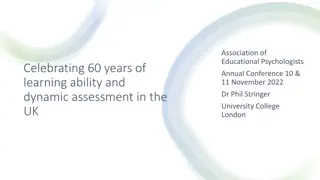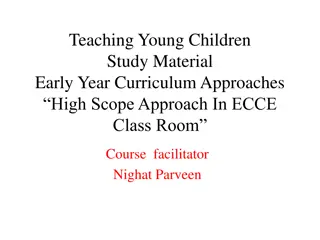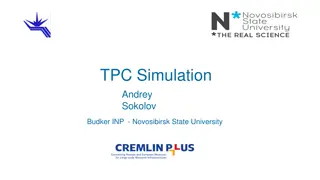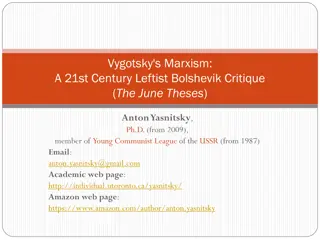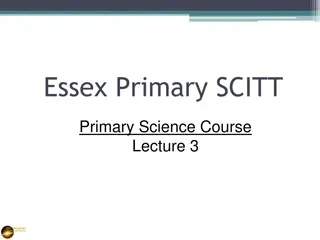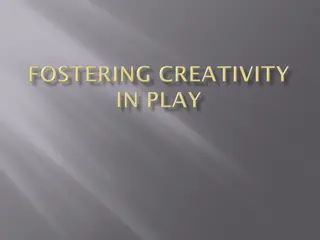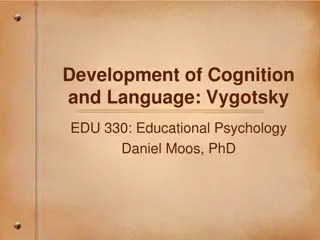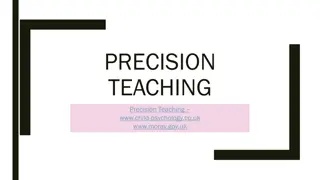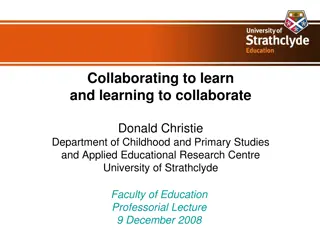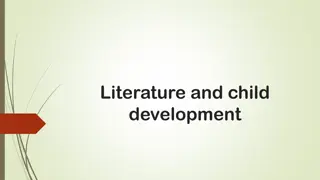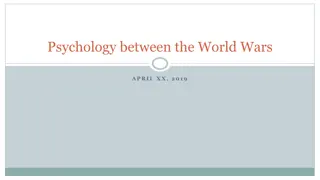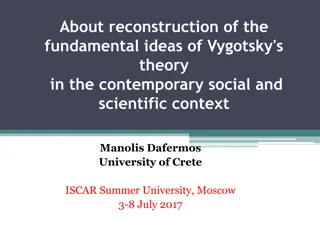Enhancing Scientific Literacy in Early Years Play-Based Learning
This PhD research proposal explores scientific literacy among children in play-based learning, focusing on everyday concepts and their application to scientific understanding. The study aims to implement Vygotsky's sociocultural theory to enhance children's scientific literacy through Vision 1 and V
7 views • 19 slides
Celebrating 60 Years of Learning: Educational Psychologists' Annual Conference
The Association of Educational Psychologists in the UK is commemorating 60 years of advancing learning ability and dynamic assessment. Topics include the importance of theory, historical reflections, and key themes like assessment approaches and cognitive development frameworks such as Vygotsky's Zo
0 views • 22 slides
Understanding the HighScope Approach in Early Childhood Education
The HighScope Approach is rooted in child development theory and research, emphasizing active learning and adult scaffolding. Children are encouraged to explore, make choices, communicate, and engage with diverse materials and ideas. This approach, based on the work of Piaget and Vygotsky, prioritiz
0 views • 34 slides
Cutting-Edge TPC Simulation Techniques at Budker INP & NSU
Cutting-edge TPC simulation techniques implemented by researchers at Budker INP and NSU include framework implementations, event displays, background simulations, track distortions, and gas medium simulations. Researchers like Andrey Sokolov, Lev Shekhtman, Vijayanand KV, and Timofey Maltsev have co
0 views • 15 slides
Vygotsky's Marxism in the 21st Century: A Critical Analysis by Anton Yasnitsky, Ph.D.
Anton Yasnitsky, Ph.D., a member of the Young Communist League of the USSR, presents a critical analysis of Vygotsky's Marxism in the 21st century. The three-volume research project explores Vygotsky's legacy and impact on psychology, challenging existing interpretations and offering new insights. T
0 views • 37 slides
Exploring Primary Science Concepts: Forces and Materials
Delve into the world of primary science with a focus on understanding materials and forces. Topics covered include properties of materials, states of matter, scientific inquiry skills, and a constructivist view of learning based on Piaget and Vygotsky's theories. The course aims to develop trainees'
0 views • 77 slides
Understanding Children's Play Development: Connecting Nature and Environment
Outdoor play connects children, both typical and atypical, to nature and their surroundings, fostering cognitive skills and imaginative play. Piaget and Vygotsky emphasized the importance of symbolic thought in play, leading to language development and diversification of skills like expression, inde
0 views • 15 slides
Understanding Vygotsky's Social-Historical Theory of Cognitive Development
Explore Lev Vygotsky's theory of cognitive development, which emphasizes the influence of social and cultural factors on learning. Discover how language plays a central role in development and learning, with various levels of speech aiding in communication and understanding. Compare and analyze cate
0 views • 16 slides
Understanding Precision Teaching: A Tailored Approach to Individualized Learning
Precision Teaching is a method that tailors teaching to individual children's needs, focusing on specific skills and providing immediate feedback for effective learning. It is based on Vygotsky's Zone of Proximal Development and Haring and Eaton's Learning Hierarchy, emphasizing fluent skill acquisi
0 views • 18 slides
Collaborating to Learn and Learning to Collaborate in Educational Research
This presentation by Donald Christie explores the essence of collaboration in educational research, examining various projects and experiences that highlight the significance of working together. From research roots to future directions, the journey emphasizes the value of respecting others, sharing
0 views • 37 slides
Understanding Child Development Through Key Researchers
Researchers like Jean Piaget, Erik Erikson, and Lawrence Kohlberg have studied various aspects of child development, focusing on cognitive, social, and moral aspects. Piaget's stages of cognitive development, Erikson's psychosocial stages, and Kohlberg's levels of moral reasoning provide insights in
0 views • 8 slides
Evolution of Psychology between the World Wars
Rapid changes in psychology between World War I and World War II marked a shift towards the U.S., driven by economic, social, and educational factors. Barriers in psychology began to diminish, with more women entering the field despite obstacles. Notable figures like Lev Vygotsky and Jean Piaget rev
0 views • 17 slides
Reconstructing Vygotsky's Theory in Contemporary Context
The reconstruction of Vygotsky's fundamental ideas in the modern social and scientific landscape is crucial due to misconceptions and challenges faced in international academic communities. This process involves understanding the cultural-historical theory, exploring broader epistemological and meth
0 views • 29 slides

